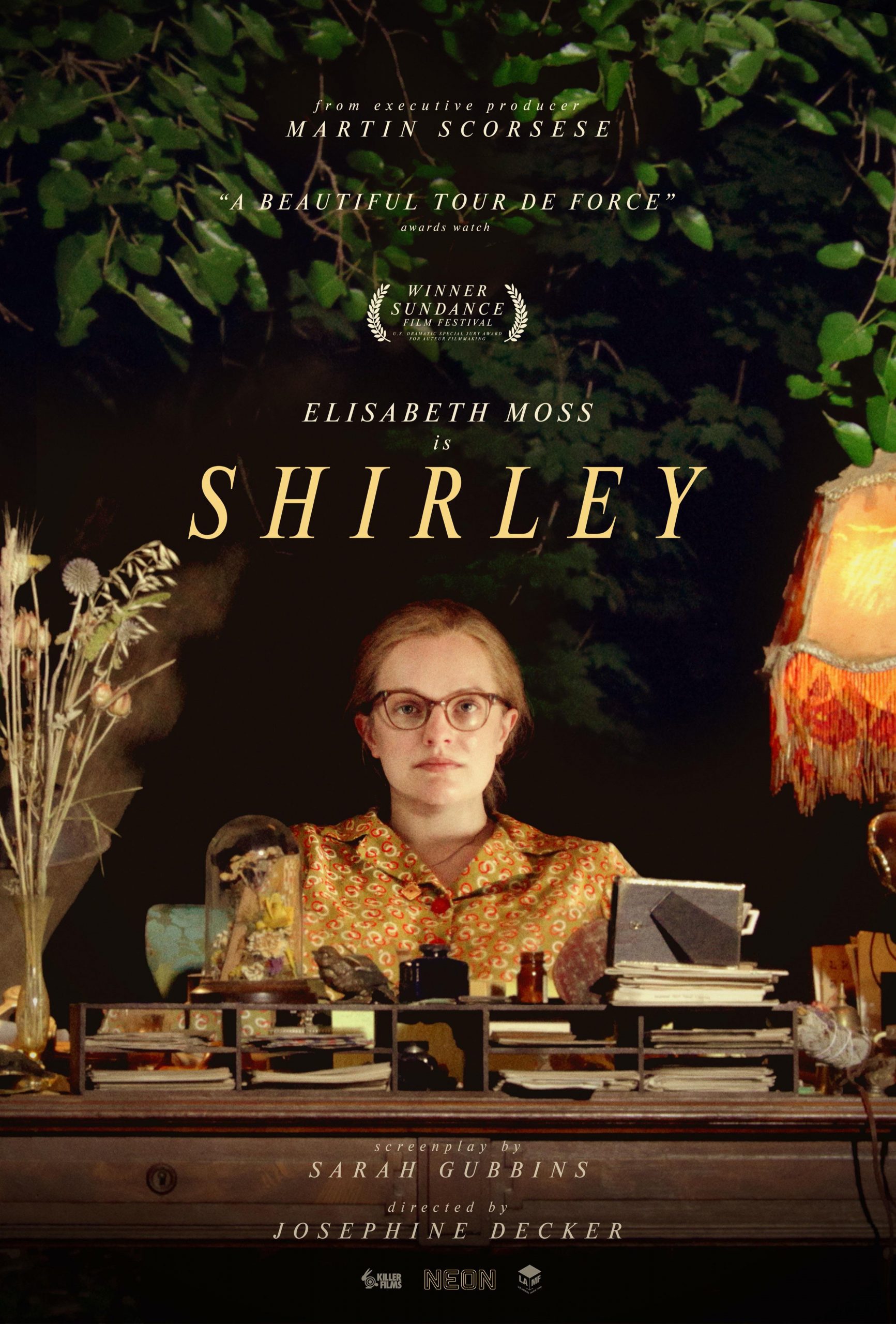
Shirley: Not a Biopic
Like many horror fans, Shirley Jackson is one of my favorite writers of all time. I’ve read almost all of her books and short stories. One of the most interesting things about her writing is analyzing how her own life impacted her stories. Going into this movie, I thought that would be the major theme. Spoiler alert: Shirley wasn’t actually about Shirley Jackson, the real-life horror author. It’s a psychological drama that uses the names of Shirley Jackson, Stanley Hyman, and a few of her short stories. But was it still good?
If it’s not a biopic, then what is it about?
The story portrayed in Shirley and the novel that it’s based on is completely fictional. The movie starts with a young couple, Fred and Rose, on a train to Bennington, Vermont. Fred is an academic, and has just gotten a job helping Professor Stanley Hyman with his research. The professor has offered for the couple to stay in his home. He is very warm and friendly, the life of the party. His wife, Shirley, on the other hand, is incredibly cold, rude, and very clearly depressed. Stanley asks Rose to basically become his housekeeper in exchange for free room and board. Pressured by her husband, Rose agrees. Soon, her husband and Stanley are gone all day at work and she is stuck in the house cleaning, cooking, and talking to Shirley. Fred is out late every night, advising the campus Shakespeare Society.
The two women start off with an antagonistic relationship (Shirley somehow guesses that Rose is pregnant, reveals it to everyone at the dinner table, and accuses Rose and Fred of having a shotgun wedding), but they soon grow close. Shirley is obsessed with the recent disappearance of a Bennington College student, and Rose agrees to help her investigate. This becomes the basis for Shirley’s new novel (you guessed it), Hangsaman.
As Shirley and Rose grow closer, Rose starts to realize how similar her own life is to the author’s. Both women are pretty much confined to the home while their husbands cheat on them with their undergraduate students. This is especially true towards the end of the movie, when Rose has her baby and must take care of the child on top of the house. The film culminates in Rose having a breakdown after Shirley reveals that there is no Shakespeare Society, and that Fred has just been using that as an excuse to sleep with his students.
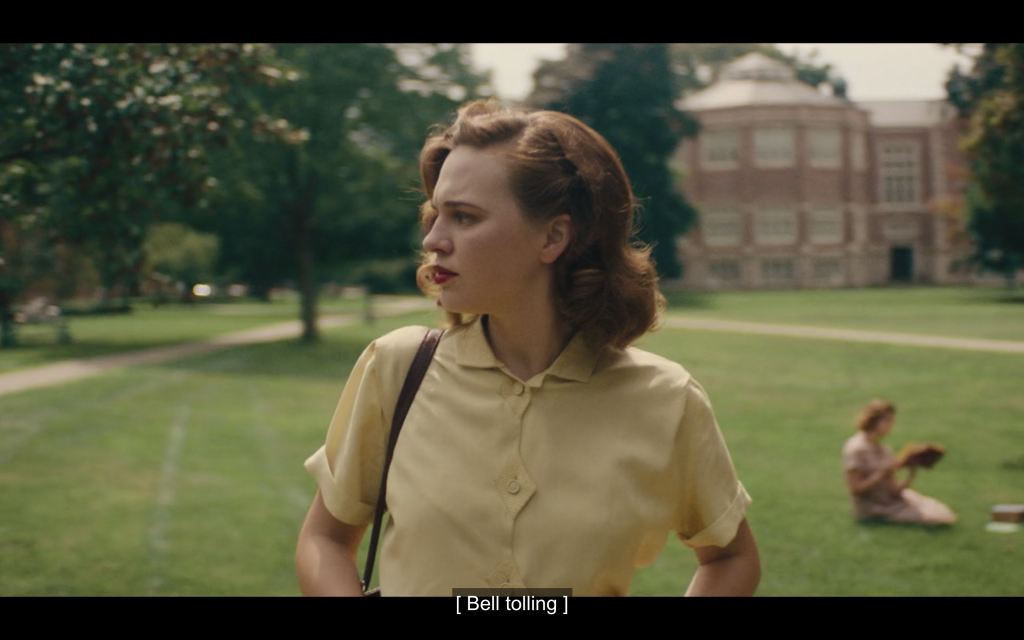
What the movie got right
This film has one of the best aesthetics I’ve ever seen. The cinematography perfectly captures a gothic vibe. I’m even using one of the screenshots I took as my computer background because it’s so creepy and beautiful. Building off of that, the soundtrack for this movie was incredible. Tamar-kali, the composer, did a fantastic job of setting the paranoid, sad, haunted tone of the film. The soundtrack really highlighted the characters’ difficult emotions. I will definitely be turning this playlist on the next time I’m writing gothic horror.
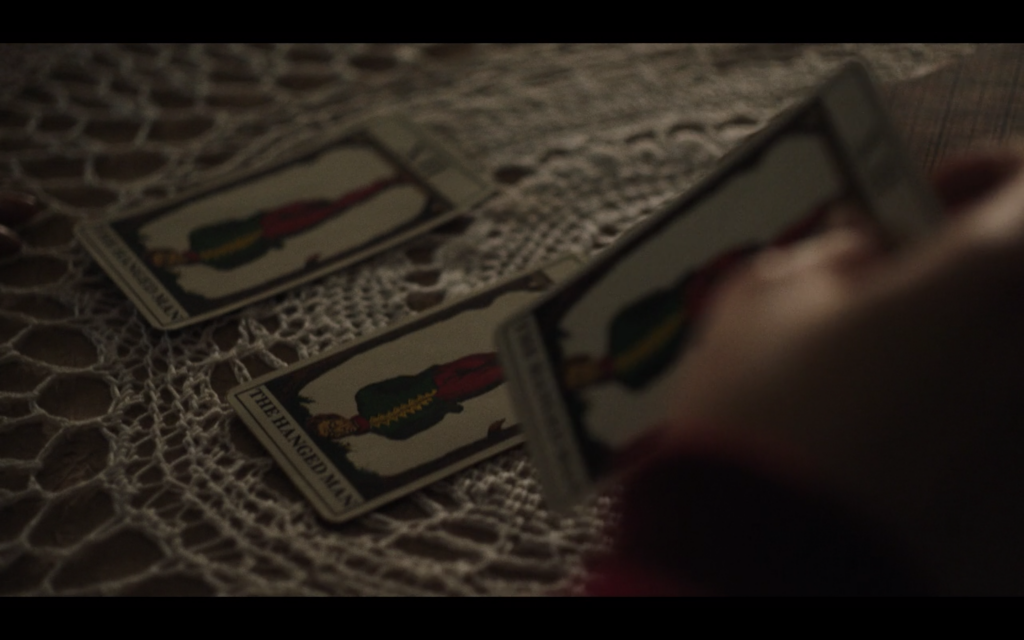
I also would be remiss if I didn’t talk about the performances. Every single actor in this film did such a great job. Odessa Young as Rose gave a really compelling performance of a character that could have ended up being quite boring. Elisabeth Moss was phenomenal in her portrayal of depression, agoraphobia, and dissatisfaction (although, to nitpick, she didn’t do a good impression of the author’s voice). The scenes where Shirley interacts with her husband are so nuanced and real. She was hard to watch, in a good way. Another standout was Michael Stuhlbarg as Stanley. He toed the line really well between being warm, manipulative, and predatory. All of the actors should get awards for this movie, in my opinion.
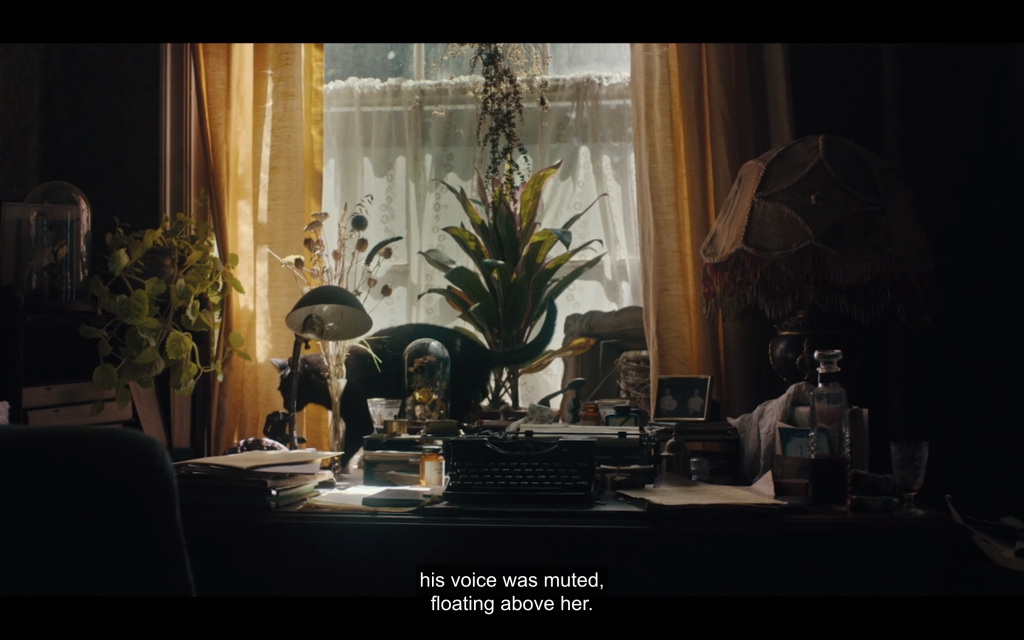
The themes in the film were fascinating. Ultimately, Shirley is about the horrors that women face in a patriarchal society, of how terrifying it is to remove yourself from the outside world, be forced to run a household by yourself, and still be invisible. This film is very claustrophobic and delves deep into the profound loneliness that these women feel. Further, it connects these feelings to the novel Hangsaman, which you should read. For that reason, I think Shirley is definitely worth watching.
Finally, there were a lot of fun easter eggs for us fans of Shirley Jackson’s work. Obviously, there are plenty of references to Hangsaman, from a stern Stanley determined to read and critique Shirley’s writing to a wild masquerade party around a bonfire. There’s also a scene featuring something no fan of We Have Always Lived in the Castle would miss: death-cap mushrooms.
What it got wrong
As the title states, this movie is not a biopic. So, I don’t fault the movie for not being true to life. However, I do think it’s interesting and important to talk about what Shirley Jackson’s life was actually like during the time the film takes place.
Shirley takes place in the late 1940s or early 1950s, after Jackson published her infamous short story The Lottery. The film portrays the author as a depressed recluse who is alone all day and obsessed with writing a novel based entirely on a real-life disappearance. In reality, Shirley Jackson’s life at the time was very different. I am by no means an expert on this woman’s life, but here are some facts that I do know about my favorite author.
Shirley Jackson with her children, North Bennington, Vermont, 1956
Jackson was actually raising four small children in suburban Connecticut during this time period. Obviously, I understand that there are legal issues that could have prevented the filmmakers from including Shirley and Stanley’s children. But, by most accounts, Shirley seemed like a fun, active mother. You can even read her own reflections on parenting in her popular memoirs Life Among the Savages and Raising Demons. According to her children, at the time the film takes place, the house was always full of play, visitors, and pets. I doubt that this real-life element would have contributed to the gothic, sad tone of the movie. And, to be fair, Jackson never loved being a housewife and did have a pretty rough marriage. Still, it was a little bizarre to see someone who was described by most people who knew her as lively and kind, if reserved, to be portrayed as brash, unhinged and downright cruel at points.
While Jackson did suffer from depression and agoraphobia after writing We Have Always Lived in the Castle, she actually seemed to have been pretty stable while writing Hangsaman. Furthermore, the film treats Hangsaman as though it’s some sort of true crime novel based on the disappearance of Paula Welden. That’s not really true. While Jackson did get some inspiration from the case while writing the novel, she wasn’t utterly obsessed with it as the character of Shirley was in the film. For a while, the movie took on this weird almost detective story tone as Shirley sent Rose to investigate the case. That was kind of jarring and had no basis in reality.
One of the worst parts about this film was that it didn’t involve Jackson’s actual writing when it could have. Throughout the movie, Shirley reads lines from her Hangsaman manuscript. These lines aren’t actual lines from the book. It was really bizarre to hear these made-up quotes when they could have just quoted the novel itself and it would have worked better. This choice I really do not understand. Hangsaman is a great book that perfectly fits the themes of the movie. Why not have Elisabeth Moss read lines from it?
Oh, and this is pure speculation but I’m pretty sure Shirley Jackson didn’t have the X-Men power of guessing when a woman was secretly pregnant.
Final Thoughts
This is a haunting, interesting film. It deals with the dread and horror of women grappling with being forced into a subservient, domestic gender role, mistreated by their husbands but unable to do anything about it. It’s about “lost girls” who live on the margins and disappear. But it is not biographical. I would really hate for people to come out of this movie thinking that it was a completely accurate portrayal of Shirley Jackson’s life. Her story was actually more empowering in reality: she broke free from a bigoted, repressive family, wrote some of the greatest horror fiction of all time, and found joy raising her children even though she had a difficult relationship with her husband. That story, to me, is more powerful than the one portrayed in Shirley, and why I didn’t love the film as much as I wanted to.
 (3.5 / 5)
(3.5 / 5)
Movies n TV
Wheel of Time A Question of Crimson Is a Political Espionage Delight
Episode two of Wheel of Time felt like the beginning of a long journey. Stories are unfolding, lives are changing, and blood is spilling.
Let’s discuss.
The story
We begin this episode in the past with Elayne’s mother, Queen Morgase. It turns out her rise to the throne was a bit, shall we say, cutthroat. So when she shows up at the White Tower, Siuan is concerned.
She might have reason to be, too.
Meanwhile, Rand, Egwene, Moiraine, Lan and Aviendha are in the Spine of The World. As they travel through some of the most breathtaking lands I have ever seen on a TV show, Egwene is plagued with nightmares. We think at first that’s just her trauma working itself through her system. But we soon find out that it might not be that straightforward.
Finally, Perrin returns home to heal after his hand is almost cut in half. But when he gets there he finds the town has been infested by Children of The Light. And they’re looking for him.
What worked
There was something heartwarming in this episode about political espionage and choking religious persecution. And that is Elayne’s relationship with her family.
I have consumed a lot of fantasy content with royal families. And I have never once heard a princess call her mother ‘Mum’. I’ve never seen royal siblings get along. And I have sure as hell never seen a princess have a good relationship with her step-parent.
This was refreshing. Even though Queen Morgase is kind of a horrible person she seems like a good mother. And that’s an unexpected delight.

Of course, this is just one storyline among many. And while this can sometimes be overwhelming, in this case it wasn’t.
I’ll be honest, some of these storylines are going to drag for me. I know this because I’ve read some of the Wheel of Time books and I have an idea that not all the characters exactly pique my interest.
No one likes all the characters. No one likes all the storylines. While I am here for the political espionage between Queen Morgase and Siuan, not everyone likes it. While others might be fascinated with Selene trying to win Rand back, I couldn’t care less.
Having multiple storylines keeps everyone’s attention better. So long as things don’t get out of hand. Things can easily get out of hand. But this seems to be managed well.
So far.
What didn’t work
As I mentioned above, I’m not thrilled with Rand’s story at this point. And while it’s fine to not like a storyline when there are this many to choose from, it’s not fantastic that the one I like the least is the one involving our two main characters. And anytime we were with the team at the Spine of The World, the only thing that brought me joy was Moirain’s hat. It reminded me of Stockard Channing’s hat in Practical Magic.
The problem is that Rand is Charlie Brown with controversial magical powers. He is boring, serious, and pessimistic.
And yes, I understand that he has a heavy emotional burden and he’s the Dragon Reborn and that’s quite taxing and all. But let’s be fair, there isn’t a single person in this show that doesn’t have a heavy burden. And most of them manage to be fun occasionally.

All that being said, this episode of Wheel of Time did exactly what it needed to do. It set up conflicts at each of the three locations. It established emotional ties between the characters and the events. And it established goals for everyone.
This was, in short, a solid episode. Not groundbreaking, not mind-blowing or life changing. It was simply good. It was entertaining and moved the plot forward.
Well done.
 (3.5 / 5)
(3.5 / 5)
Movies n TV
Wheel of Time Returns With A Bang
Wheel of Time is back for season three. There are mixed feelings regarding this. Last season, there were some serious pacing issues. And some serious sticking to the book’s storyline issues. But we’re two seasons in, and we don’t give up so easily. So let’s dive into episode one, To Race the Shadow.
By the way, I highly recommend watching this episode with the subtitles on. You’ll see why.
The story
We begin this episode with Liandrin facing a trial of sorts for her rampant betrayal. She does her best to gaslight her Aes Sedai sisters into thinking that Siuan Sanche is the real traitor.

When that doesn’t work, she reveals how many Black Aes Sedai have actually infiltrated the tower.
Spoiler, it’s a lot.
In the aftermath, our whole team gathers to drink and enjoy one night of relaxation before they head out to the Tear to form an army for Rand. All is going well until they’re attacked by myriad creatures and a sentient axe.
What worked
This episode was long. It had a run time of an hour and eleven minutes. And a lot of that run time was spent in heavy dialog scenes.
Fortunately, these were well-done scenes.
If you’re going to have a lot of talking scenes, there are good ways and bad ways to do it. Last season, we saw lots of examples of the bad way to do it. But this episode did it well. For one thing, other things were going on while conversations were taking place. The characters are drinking, playing games, walking through an interesting city. And the scenes themselves didn’t stretch out. They weren’t repetitive. We heard what the character had to say, then we moved on.
It was also nice that the point of these scenes wasn’t just info dumps. We had character development. We had romantic interactions. We had plot development and foreshadowing.
Overall, this episode felt like what it was. A moment of calm before a storm.
Taking a step back, I’d be remiss if I didn’t address the fight scene at the start of the episode. Because it was epic.
The magic looked amazing. The martial arts that went along with it looked fantastic. The costumes were beautiful. It was just incredibly fun to watch.
More than that, it was emotional. We lost some characters in that fight that were important. And it was clearly emotionally shattering for many of our characters, who found themselves betrayed by people they trusted.
So many of them.
It was a great way to open the season.
What didn’t work
Despite that, this episode wasn’t without its flaws.
First off, there were a lot of dialog scenes. And they were good scenes, as I’ve already discussed. But it was one after another after another. And when your episode is, again, an hour and eleven minutes, it’s maybe a little much to have so much chit-chat. Couldn’t some of these conversations, important as they were, have been moved to maybe another episode?
Finally, I want to talk about Egwene’s travel through the arches.

I feel like maybe there were some deleted scenes here. Because there must have been more to that visit than what we saw, right?
We could have seen Egwene battle Rand. That would have been badass and emotionally devastating. We could have seen her with a quiet life with Rand back home at the Two Rivers. We could have seen anything except for the quick clip of Rand in a bloody river, followed by Egwene being shoved back out in a bloody shift.
Bad job. But at least it wasn’t an extended scene of Moiraine collecting bathwater, and then taking a bath while looking sad. If we’d started this season with another scene like that, it might have broken my brain.
Amazon dropped the first three episodes at once. So we’ll be back soon to talk about episode two. See you then.
 (4 / 5)
(4 / 5)
Movies n TV
Entertaining as hell: Eight Legged Freaks (2002) Review
Early 2000s is a special era for the industry. It accepts the cheesiness and corniness of movie making, in turn producing some gems in their own right. Eight Legged Freaks starring David Arquette and young Scarlet Johanson is a horror comedy about giant spiders who overtake a small town. As crazy as that premise sounds, the movie surprisingly has a ton of heart and is super entertaining. Let’s review, shall we?
Plot
We start Eight Legged Freaks with a shot of toxic waste spilling into the water supply of Joshua, a spider farm owner. He is friends with Mike, one of our protagonists, who is a science geek and a spider enthusiast. Mike notices something quite right upon visiting Joshua, but no one takes him seriously. We are then introduced to the rest of the crew. Mike’s mother Samantha, the town sheriff, is too busy chasing Ashley, his sister, who is dating the town mayor’s son Bret (something Samantha does not approve of). We also have Chris, who returns to the town to save his father’s legacy in the town mines. He has opposition from Wade, Bret’s father, who wants to use the mines for his business ventures. Lots of drama going on that will only get juicier once the spiders get loose.
The creepy crawlies quickly dispose of Joshua and make their grand appearance after Ashley rejects Bret’s advances, abandoning him in the middle of a desert. A glorious chase sequence ensues as the spiders make their way towards the town, wreaking havoc on its residents. In a true horror fashion (which the movie acknowledges), it takes some convincing from Mike and then from Samantha for the town to take the threat seriously. The tongue-in-cheek style of narrative adds the comedy aspect to a movie that would otherwise burn out fairly quickly.
The remaining characters hide out in a shopping mall as it’s the only somewhat sturdy building in the area. This doesn’t last long as the spiders break in, forcing them to run through the mines. Their resources to fight the creepy crawlies off are limited as the methane gas doesn’t allow them to use firearms. Such conditions require resourceful thinking from Chris, who uses perfume to fend off the leader of the spider group and save himself during the climax of the movie.
Character dynamics are not forgotten once the action kicks in. We have Chris confessing his long-term feelings for Samantha which she knew all along, which provided some comedic relief. Bret also reunites with Ashley and apologises for being an asshole. Mike finally gets the appreciation he deserves as his knowledge saves the townsfolk more than once during the whole ordeal.
We end the movie with the town’s radio show person telling the story as an urban legend during his segment. This brings it into question – how much of it happened the way he said it did? We can only guess…
Overall thoughts
Eight Legged Freaks is a fun creature feature with some self-aware commentary on genre tropes that doesn’t take itself too seriously. The acting is good, the pacing fitting and the characters are likeable enough for you to want them to make it through. Definitely a must watch, if you don’t suffer from arachnophobia, that is.
 (5 / 5)
(5 / 5)

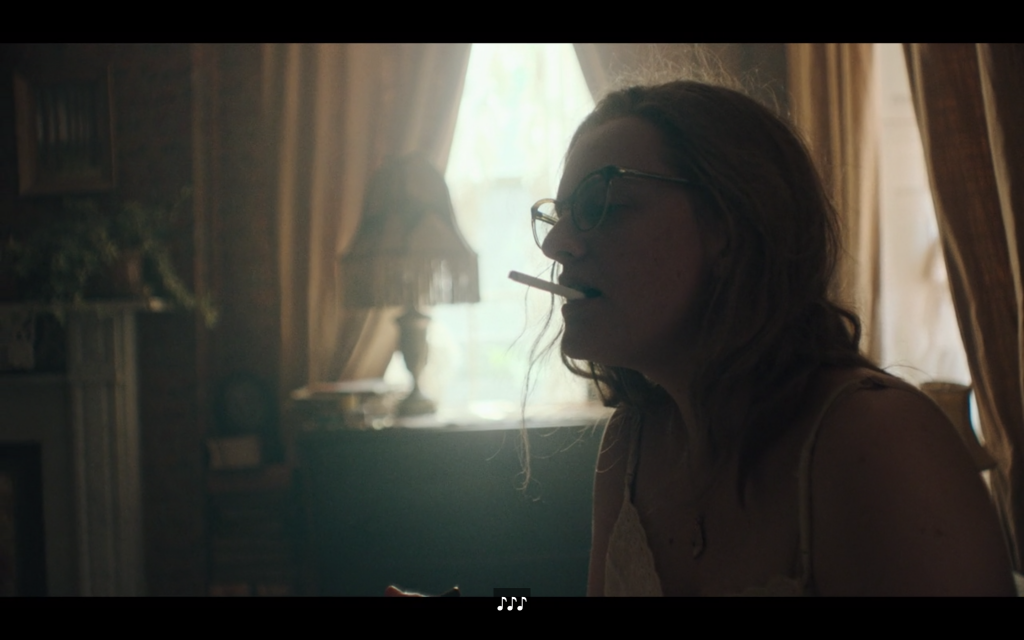
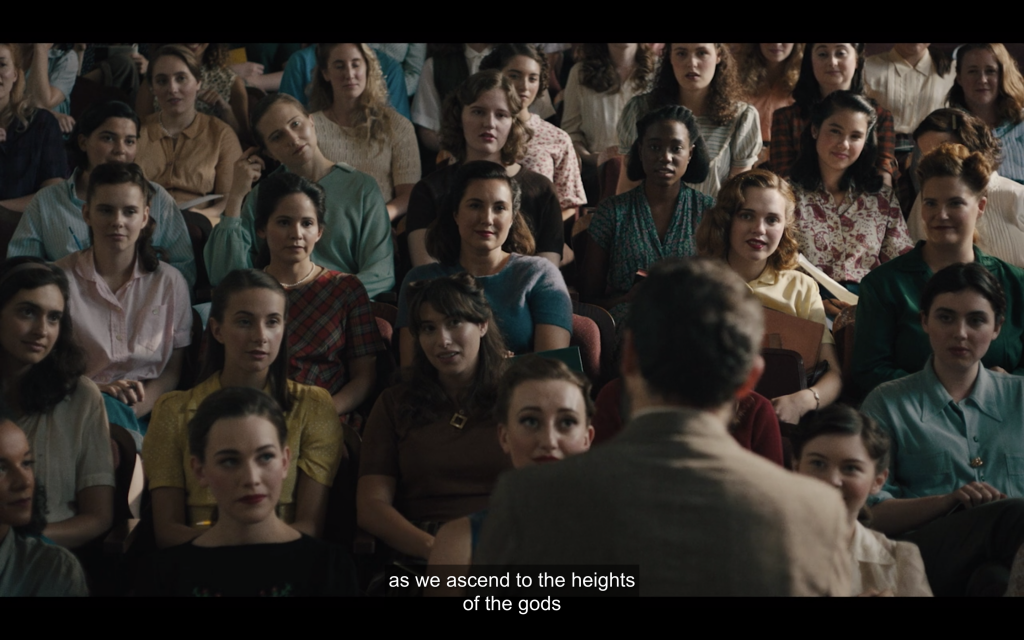
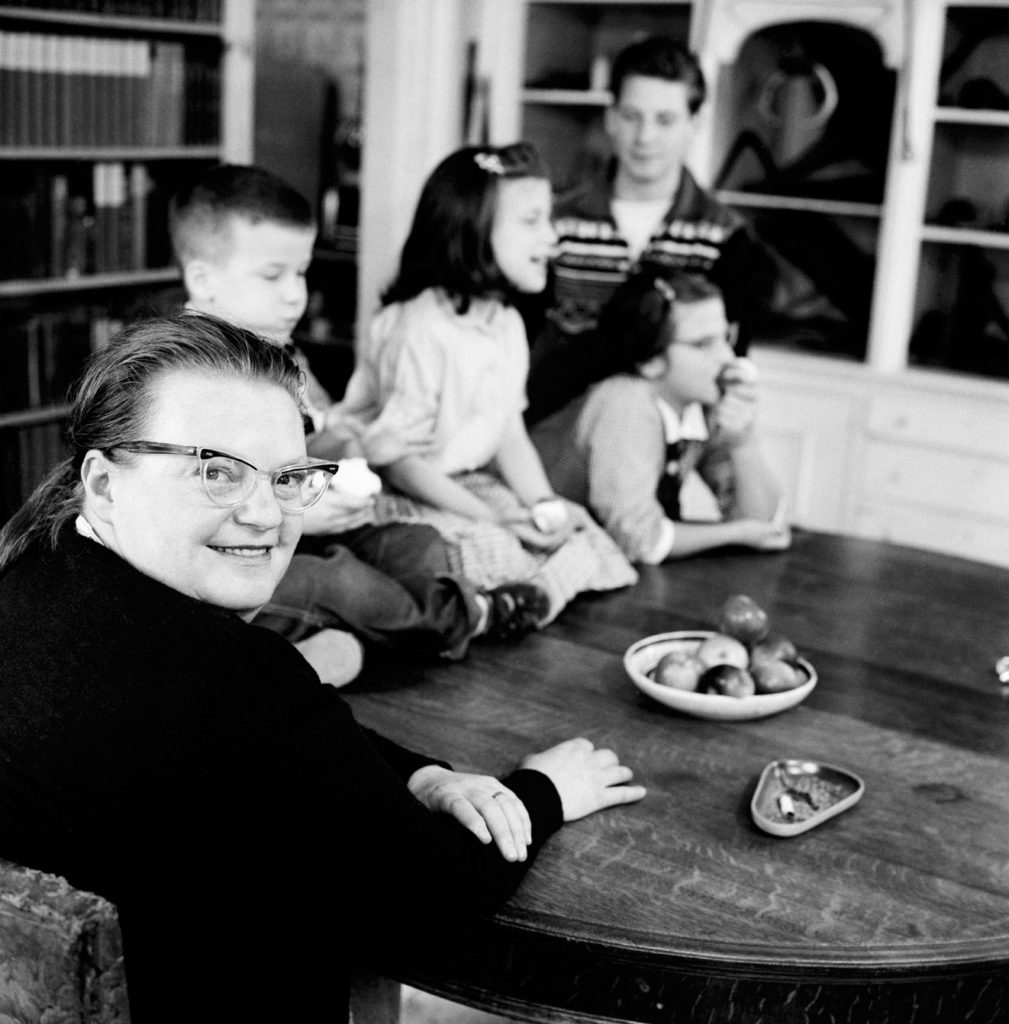
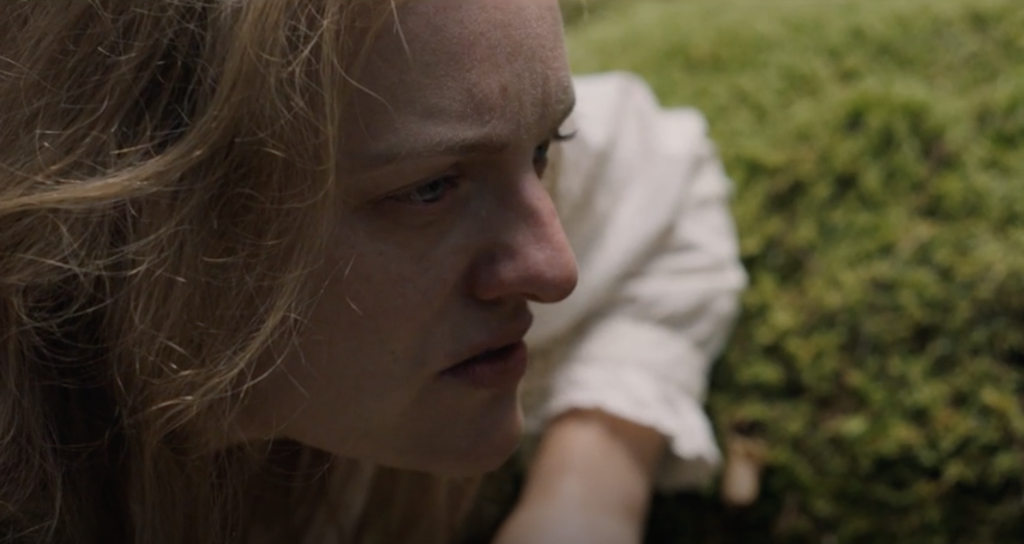








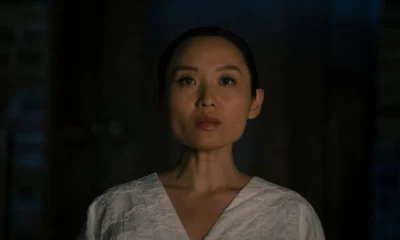



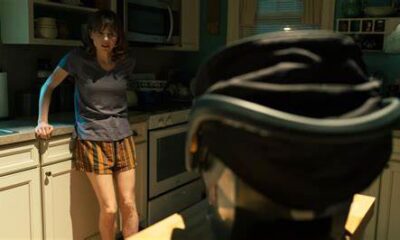

Brianna Schullo
July 9, 2020 at 4:53 pm
This is an excellent and thorough review! I really enjoyed Shirley too, but was unsure of the authenticity. Thanks for teaching me even more about Shirley Jackson’s real life!
Kristin Cleaves
July 9, 2020 at 7:04 pm
Excellent analysis and facts about Jackson’s real life. Thanks for pointing out the differences!